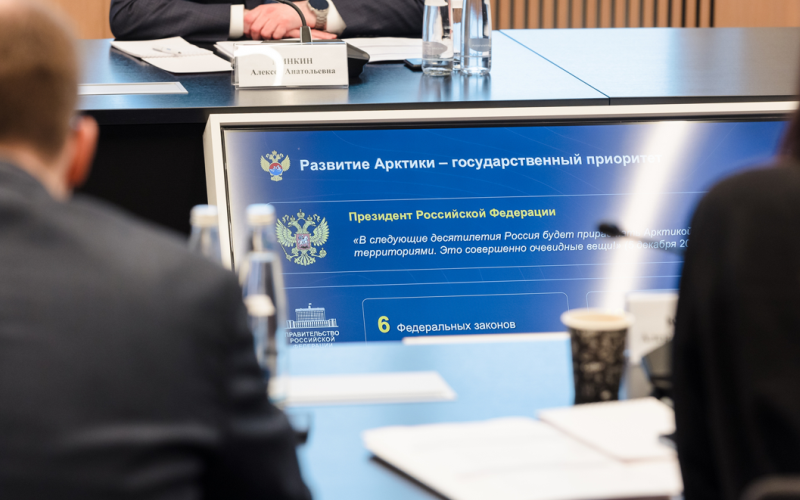
Today in the Murmansk region, under the leadership of Governor Andrey Chibis, a meeting of the working group on ensuring transport, logistics and socio-economic development of the Arctic zone of the Russian Federation was held for the first time. About 80 people took part in the event personally and via video link, including representatives of federal agencies, the Federation Council and the State Duma, heads of regions of the Arctic zone, heads of companies and organizations. The meeting was organized at one of the largest construction sites in the country — at the Center for the Construction of Large-capacity offshore structures of NOVATEK.
"The working Group was created on behalf of the President of the country and is a platform for an open dialogue and the development of necessary proposals in terms of transport, logistics and economic development, as well as improving the quality of life of citizens living and working in the territory of the Russian Arctic," Andrei Chibis said, opening the meeting.
The head of the region noted that despite the pressure exerted on our country, the Arctic regions are becoming a base for new large-scale projects.
"A qualitative leap forward in terms of creating high-tech industries in the Arctic zone will open up additional opportunities and ensure the influx of professional personnel to the Arctic. The development of comprehensive solutions for the implementation of state policy in the Arctic should be based on the position of the regions, including in order to solve the most significant problems for the Russian Arctic," said Andrey Chibis. — The Arctic potential is great, and we need to concentrate on making the Arctic territories an attraction for life and work, especially for young people. One of the possible measures we propose to consider the possibility of a comprehensive distribution of mechanisms operating in the Far East. For example, the modernization of the Single Arctic Subsidy for the social development of economic growth centers in the regions of the Russian Arctic, an increase in the budget for a Single Arctic subsidy, the development of master plans for tourist and recreational clusters and cities in the Russian Arctic in order to ensure their infrastructural development, the Arctic mortgage and a set of measures to support housing construction, proposals for the development of a system of social guarantees for workers in the areas of the Far North. We will discuss all this in detail today."
In a video greeting, Assistant to the President of the Russian Federation, Secretary of the State Council of the Russian Federation Igor Levitin recalled that work on the development of the Arctic will be carried out within the framework of the tasks set by the President and the Government.
"We need information from the regions: how the current programs affect people's lives. What mechanisms are necessary to support them so that young people come here, modern technologies develop. We should suggest what to do, focus on the issues that we have considered at the large commissions. And to submit proposals to the meetings of these commissions," Igor Levitin said.
Deputy Chairman of the Federation Council of the Federal Assembly of the Russian Federation Galina Karelova expressed gratitude for the active involvement of colleagues from all regions of the Arctic zone.
"In the face of new challenges, the development of the Russian Arctic is of particular strategic importance for the state. This requires consolidation of efforts at all levels of government," Galina Karelova stressed.
The Minister of the Russian Federation for the Development of the Far East and the Arctic, Alexey Chekunkov, recalled that the Russian Arctic is an area of 5 million square kilometers. 3/4 of Russian natural gas, 1/5 of Russian oil are extracted here, the reserves of the Russian Arctic are a significant percentage of the global and strategic resources in the new economy: 25% platinoids, 20% natural gas and 11% titanium. Therefore, it is strategically important to ensure the development of technologies and the investment attractiveness of the region. State support mechanisms have made it possible to attract 1.6 trillion rubles of investments in 634 investment projects that are being implemented today by residents of the Arctic zone and the territory of advanced development. According to the development plan of the Northern Sea Route until 2035, the total budget investments in the development of this transport artery and related infrastructure will amount to 1.8 trillion rubles.
The head of the Ministry of Regional Development thanked the Governor Andrey Chibis for the format of the working group.
"Our work is to improve the quality of life of people and the development of the economy in the Russian Arctic, has an impact on the well–being of Northerners, the whole country. We are working to make it really pleasant for people to live in the North. The entire territory of the Russian Arctic is recognized as a free economic zone, territories of advanced development have been created, in the Murmansk region it is the "Capital of the Arctic". There are preferences and tax incentives, mechanisms for subsidizing the construction of infrastructure. Last year, funding was allocated for the construction of electric power infrastructure for residents of the TOP. And being now on the territory of a unique enterprise of one of the largest residents, we see that this work is going well, it is a priority and beneficial for Russia," Alexey Chekunkov stressed.
Alexey Chekunkov recalled that at the request of residents of the Arctic zone, during the visit of Prime Minister Mikhail Mishustin, the "Hectare of the Arctic" program was launched in 2021.
"I thank Andrey Vladimirovich and the residents of the Murmansk region for their attention to the program. Since its beginning, more than 11 thousand applications have been received and about 3.5 thousand people have already signed contracts for free use, objects have been implemented in 70% of cases," Alexey Chekunkov said.
/ Ministry of Information Policy of the Murmansk Region /
